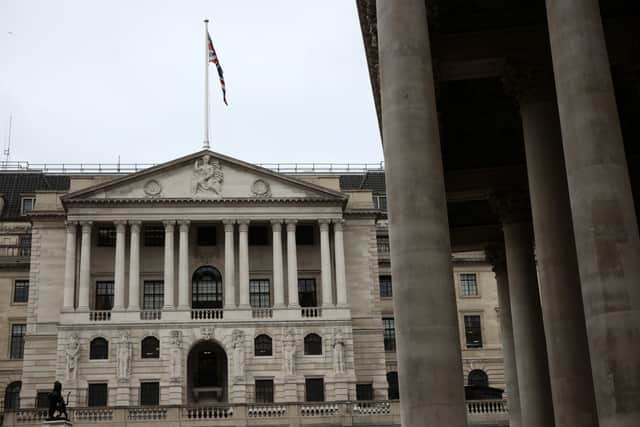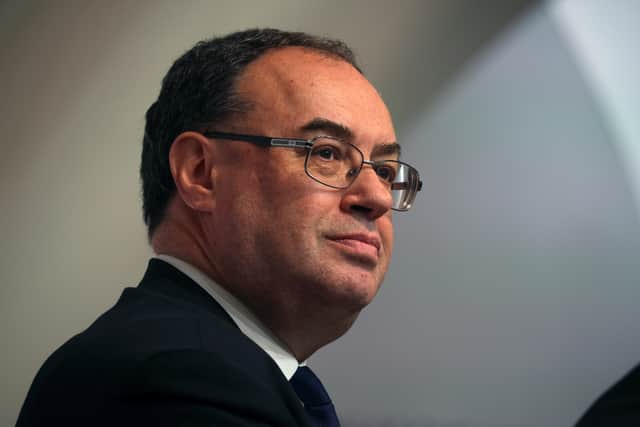Interest rates announcement: Bank of England decision to increase rate - and what it means for mortgages
This article contains affiliate links. We may earn a small commission on items purchased through this article, but that does not affect our editorial judgement.
and live on Freeview channel 276
The Bank of England has raised interest rates to 0.5% from 0.25%, and signalled more hikes are on the way.
It came as it warned rocketing energy prices will drive inflation to an eye-watering 7.25% in April, which is the highest level since August 1991.
Advertisement
Hide AdAdvertisement
Hide AdMembers of the nine-strong Monetary Policy Committee (MPC) increased interest rates as the bank’s quarterly set of forecasts are likely to show eye-watering inflation this spring.
It marks the bank’s first back-to-back increase since June 2004, coming after it lifted rates from 0.1% to 0.25% in December to try to rein in rampant inflation.


Why have rates been increased?
Four of the nine members called for a steeper rate increase – to 0.75% – to help put the brakes on rampant inflation.
The bank had predicted the economy would grow by 7.25% in 2021, but has since pared this back to 3.75% for this year and 1.25% in 2023, from the 5% and 1.5% respectively predicted in November.
Advertisement
Hide AdAdvertisement
Hide AdFinancial markets are now pricing in four rises in 2022, which would see rates hit 1.25% by the year end, with a further rise to almost 1.5% by next spring – the highest level since January 2009.
In a gloomy prediction for under-pressure households, the Bank said this will see disposable incomes fall by around 2% – the worst impact since Bank records began in 1990.
Ofgem’s 54% energy price cap increase to around £1,971 in April is the driving force behind the inflation forecast hike, with the Bank predicting around another 10% rise in the cap this October.
But its forecasts do not take into account the Chancellor’s package of measures announced on Thursday, offering £350 support for the majority of UK households.
What has the Bank of England said?
Advertisement
Hide AdAdvertisement
Hide AdThe Bank of England said while the economy is expected to bounce back quickly from an Omicron impact in December and January, growth will then slow to “subdued rates” as inflation impacts spending.
This is set to send Britain’s jobless rate rising from 4% this year to 5% in 2024.
In minutes of the rates decision, the Bank said: “Given the current tightness of the labour market and continuing signs of greater persistence in domestic cost and price pressures, the committee judges that an increase in Bank Rate of 0.25 percentage points is warranted.”
It added that “some further modest tightening in monetary policy is likely to be appropriate in the coming months”.
Advertisement
Hide AdAdvertisement
Hide AdAt a press conference following the rates decision, Bank governor Andrew Bailey said the Chancellor’s support measures outlined on Thursday would help take some of the pressure off households.
In response to concerns that the back-to-rate rises come at the worst time for households, he said: “If we don’t take this action, it would be even worse.
He said: “I know it’s a hard message.”
“We have not raised interest rates today because the economy is roaring away.
“The economy is only now back to the size it was immediately before the pandemic, a couple of years ago.
Advertisement
Hide AdAdvertisement
Hide Ad“An increase in Bank rate is necessary because it is unlikely that inflation will return to target without it.”


What does it mean for mortgages?
Homeowners struggling to cope with rising mortgage costs on top of other surging bills are being urged by lenders to contact them early.
People whose mortgages directly track the base rate will feel an immediate impact of the rate rise.
Around three quarters (74%) of residential mortgages are on a fixed rate – protecting homeowners from the immediate impact of Thursday’s base rate increase.
Advertisement
Hide AdAdvertisement
Hide AdSome 850,000 outstanding mortgage deals are trackers, while more than a million are standard variable rate (SVR) deals. SVRs are set by mortgage lenders individually.
According to Moneyfacts.co.uk, the average SVR is currently 4.46%.
If Thursday’s base rate increase is passed on in full to an average SVR mortgage, this could add more than £680 over two years onto someone’s payments, based on them having a £200,000 mortgage, according to calculations from Moneyfacts.
If the base rate were to rise to 1% in future and was fully passed on to an SVR, this could add more than £2,000 to repayments over two years, compared with the previous rate at 0.25%, Moneyfacts found.
How much of an increase could those on tracker mortgages see?
Advertisement
Hide AdAdvertisement
Hide AdAccording to calculations from trade association UK Finance, Thursday’s rate increase could add around £26 per month onto a typical tracker customer’s repayments.
A base rate increase to 1.0% could potentially add £77 onto typical monthly tracker repayments compared with repayments when the base rate was set at 0.25%, according to UK Finance’s calculations.
And if the base rate increased to 1.5%, this could add around £129 onto monthly repayments, compared with the previous 0.25% rate.
Paul Broadhead, head of mortgage and housing policy at the Building Societies Association (BSA), said: “Given the rising costs of living, including the increase in the energy price cap that we have seen this morning and the tax hikes coming in April, the bank rate rise will be unwelcome news for many.”
Advertisement
Hide AdAdvertisement
Hide AdHe added: “Lenders are sensitive to the rising number of people facing a squeezed household budget and the advice to anyone worried about their ability to pay their mortgage, particularly on top of energy and food price rises, is to get in touch with their lender early.”
A message from the editor:
Thank you for reading. NationalWorld is a new national news brand, produced by a team of journalists, editors, video producers and designers who live and work across the UK. Find out more about who’s who in the team, and our editorial values. We want to start a community among our readers, so please follow us on Facebook, Twitter and Instagram, and keep the conversation going. You can also sign up to our email newsletters and get a curated selection of our best reads to your inbox every day.
Comment Guidelines
National World encourages reader discussion on our stories. User feedback, insights and back-and-forth exchanges add a rich layer of context to reporting. Please review our Community Guidelines before commenting.
